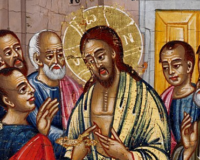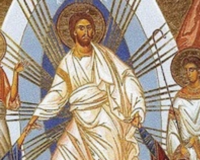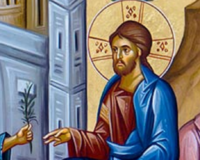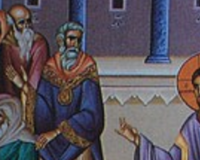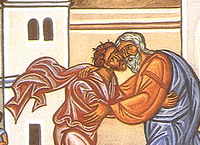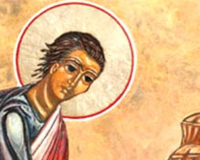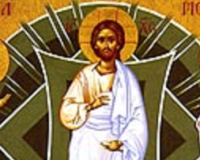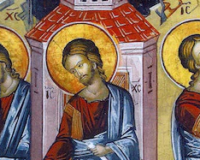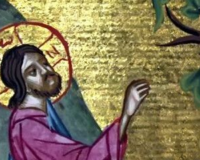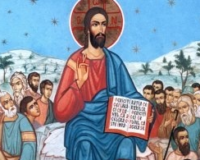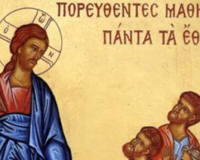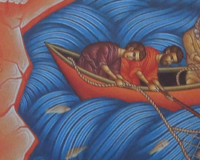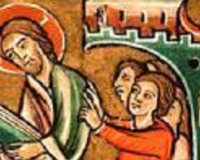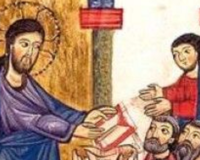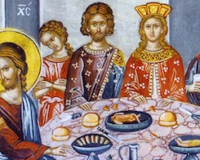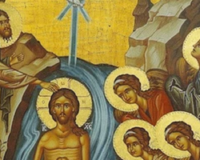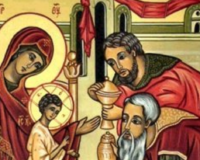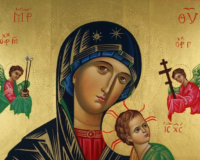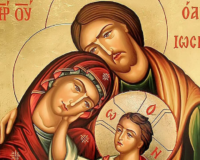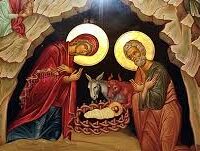Second Sunday of Easter Scripture Readings These few verses, encompassing two appearances of the risen Jesus to his disciples, were meant to be the conclusion of John’s Gospel and a parallel to the Prologue that began it. As the Gospel began with the eternal Word of God’s presence within the creation of all things, so it ends with the Word’s presence in and through the new creation, Christ’s Church, in which he is all in all. The same Spirit that breathed upon the waters of chaos to bring forth God’s creation now is breathed upon the disciples as Jesus sends them out to heal the soul-sickness of the world. The disciples are given a mission, namely, to continue the work of creation, bringing light out of darkness, order out of chaos, life out of death, and they’re given power to accomplish this mission—the power of the Holy and creative Spirit of God himself. As always, John isn’t concerned with how many times the risen Jesus appeared, over what length of time, or to how many people. John wants us to experience the results of the Resurrection not just for Jesus but, more particularly, for us. For John, the entirety of Jesus’s Resurrection and Glorification happens in one day—the day of Resurrection, Easter. In his first appearance that morning, Jesus warned Mary Magdalene not to cling to him, because he had not yet ascended to his Heavenly Father. Yet now, in the evening of the same day, he’s there in his wounded body, bestowing the gift of the Holy Spirit—a gift he told them they could not receive until after he had returned to the Father. In other words, for John, the Resurrection, Ascension, and bestowal of the Holy Spirit were all accomplished on that same day. Here’s where we can encounter the true depth of the mystery expressed in the Gospel. Jesus appears to his followers in his human body, but transformed. It has all the features of a human body but taken to a higher level, unconstrained by the limitations we struggle with: energy and matter, space and time. Still, it appears ordinary…even more than ordinary…it appears damaged, wounded. Yet, it’s capable of exercising and bestowing on others the healing and creative power of the Spirit of God himself. If we can appreciate what John is telling us in this appearance of Jesus at the end of the day, we can see Jesus giving the Church its mission to bring to the world the healing power of God. The Church is sent to heal, but in human form: disfigured, wounded, broken, but raised up. The second appearance John describes is equally as significant as the first. We know the Apostle Thomas now as “Doubting Thomas,” but we’d do well to look at him differently. From the other evangelists, we know that Thomas wasn’t alone. Many of the disciples were skeptical of the news of the Resurrection. It was only their personal encounters with Jesus that convinced them. Is skepticism such a bad thing? Isn’t it true that, when skeptics are convinced, they become the fiercest of proponents? So it is with Thomas. His encounter with the wounded, risen Jesus leads him to the strongest profession of faith in all of the gospels: “My Lord and my God.” All our Scriptures speak of the Lord God, in Greek Κυριος Θεος (Kyrios Theos), in Hebrew יהוה אלהים (Yahweh Elohim). As long as our minds are open and as long as we haven’t contempt before investigation, a healthy skepticism can lead to a still more profound faith. In this secondאלוהיםappearance, we see the full progression of faith, only, as it were, in reverse. Jesus has been called “the sacrament of the encounter with God” because whoever encounters Jesus encounters the Father, as Thomas did. Yet, in reply, Jesus said, “Blessed are those who have not seen and have believed.” It is in his wounded body, the Church, the repository of God’s Holy Spirit breathed into it by Jesus himself, that we encounter him. It’s hard to see the image of the Father in the wounded Jesus—even the wounded Jesus raised from the dead. How much harder to see that image in the Church? We bring the full force of our skepticism to bear when we look for Jesus there. “Unless I see the mark of the nails in [its] hands and put my fingers into the nailmarks and put my hand into [it]s side, I will not believe.” How then can we see the Father in the wounded Body of Christ, the Church? John says to us, “But these [signs] are written that you may [be believing] that Jesus is the Christ, the Son of God, and that through this belief you may have life in his name.” In other words, it’s in the encounter with the Gospel—the Good News—that we come to see its source, the Body of Christ, the Church, as what it truly is, since the gospels are the expression of the presence of the Holy Spirit of God in the Church. And it’s through faith that the Church is, indeed, the risen Body of Christ, despite all the evidence to the contrary. It’s there that we encounter the wounded and risen Jesus and put our fingers in his nailmarks and our hand into his side. It’s in that faith, that trust that Jesus is the glorious image of the Father and the conduit of the Spirit of life and of love where we find the deathless love of the Father for us. There is the sure hope of our resurrection, not just from physical death, but from all our faults, failings, fears, and sufferings. It’s through the gospels that we come to see the image of the risen Jesus in the Church and the image of the Father in Jesus glorified, and we come to believe. That’s the metanoia Jesus spoke about, the change of mind and heart that comes from belief in the Good News: Christ […]
